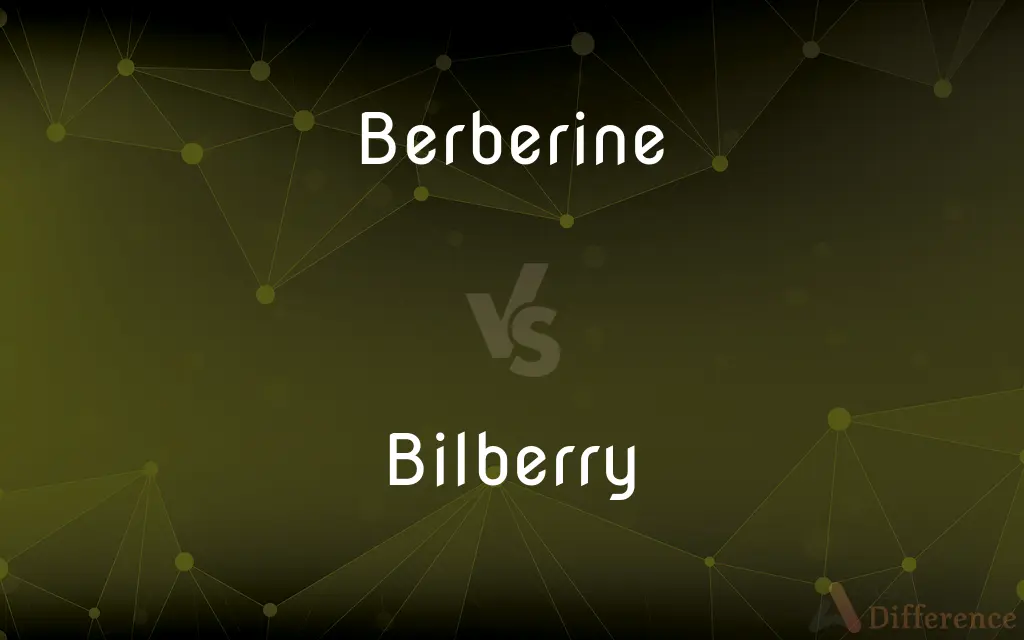Berberine vs. Bilberry — What's the Difference?
Edited by Tayyaba Rehman — By Fiza Rafique — Updated on March 27, 2024
Berberine is known for its antimicrobial properties and impact on metabolic health, while bilberry is celebrated for its antioxidant benefits and vision support.

Difference Between Berberine and Bilberry
Table of Contents
ADVERTISEMENT
Key Differences
Berberine is a bioactive compound extracted from several plants, used traditionally in Chinese and Ayurvedic medicine primarily for its antimicrobial and anti-inflammatory properties. Whereas bilberry, a relative of the blueberry, contains high levels of anthocyanins, giving it potent antioxidant properties beneficial for eye health and circulation.
Berberine has been studied for its potential to improve insulin sensitivity and blood lipid profiles, making it beneficial for managing type 2 diabetes and heart health. On the other hand, bilberry is often recommended for improving night vision and protecting against eye conditions like age-related macular degeneration, thanks to its antioxidant content.
While berberine's benefits are more related to metabolic health and managing microbial infections, bilberry's strengths lie in enhancing visual health and protecting against oxidative stress. However, both share anti-inflammatory effects, albeit acting through different mechanisms and on different aspects of health.
Research on berberine has highlighted its role in activating AMP-activated protein kinase (AMPK), which is involved in cellular energy homeostasis. Bilberry, however, is more focused on strengthening capillaries, improving blood flow, and preventing cell damage through its high antioxidant capacity.
Despite their different primary uses, both berberine and bilberry have been recognized for their potential in supporting overall health, with berberine focusing on metabolic and cardiovascular health, and bilberry being more targeted towards eye health and protection against oxidative stress.
ADVERTISEMENT
Comparison Chart
Main Use
Metabolic health, antimicrobial
Vision support, antioxidant
Active Compounds
Alkaloids, including berberine
Anthocyanins, flavonoids
Health Benefits
Improves insulin sensitivity, lipid profiles
Enhances night vision, supports eye health
Traditional Use
Chinese and Ayurvedic medicine for infections, digestion
European traditional medicine for vision and circulation
Research Focus
Metabolic syndrome, diabetes management
Eye health, prevention of oxidative stress
Compare with Definitions
Berberine
Antimicrobial Agent.
Berberine is used as a natural remedy for gastrointestinal infections.
Bilberry
Eye Health Promoter.
Bilberry is beneficial for preventing age-related macular degeneration.
Berberine
Lipid Level Regulator.
Berberine has been shown to reduce cholesterol levels, benefiting heart health.
Bilberry
Antioxidant Powerhouse.
The high anthocyanin content in bilberry protects cells from oxidative stress.
Berberine
Anti-inflammatory.
Berberine reduces inflammation markers in the body, supporting overall health.
Bilberry
Anti-inflammatory.
Similar to berberine, bilberry also has anti-inflammatory properties beneficial for overall health.
Berberine
Metabolic Booster.
Supplementing with berberine can improve insulin sensitivity in individuals with type 2 diabetes.
Bilberry
Vision Support.
Bilberry supplements are taken to improve night vision.
Berberine
AMPK Activator.
By activating AMPK, berberine helps in regulating cellular energy balance.
Bilberry
Circulation Enhancer.
Bilberry improves blood flow, particularly beneficial for eye health.
Berberine
Berberine is a quaternary ammonium salt from the protoberberine group of benzylisoquinoline alkaloids found in such plants as Berberis, such as Berberis vulgaris (barberry), Berberis aristata (tree turmeric), Mahonia aquifolium (Oregon grape), Hydrastis canadensis (goldenseal), Xanthorhiza simplicissima (yellowroot), Phellodendron amurense (Amur cork tree), Coptis chinensis (Chinese goldthread), Tinospora cordifolia, Argemone mexicana (prickly poppy), and Eschscholzia californica (Californian poppy). Berberine is usually found in the roots, rhizomes, stems, and bark.Due to its yellow color, Berberis species were used to dye wool, leather, and wood.
Bilberry
Bilberries (), or occasionally European blueberries), are a primarily Eurasian species of low-growing shrubs in the genus Vaccinium (family Ericaceae), bearing edible, dark blue berries. The species most often referred to is Vaccinium myrtillus L., but there are several other closely related species.
Berberine
A bitter, yellow alkaloid, C20H19NO5, obtained from several plants such as goldenseal and having medical uses as an antipyretic and antibacterial agent.
Bilberry
A low-growing deciduous shrub (Vaccinium myrtillus) of the heath family native to Eurasia and western North America, having edible bluish-black berries borne singly or in pairs, used for making jams, jellies, and juice and for medicinal purposes.
Berberine
Any of a class of alkaloid C20H19NO5 originally obtained, as a bitter, yellow substance, from the root of the barberry, goldthread, and other plants. It is used in medicine especially for its antimicrobial properties.
Bilberry
Any of several similar plants of the genus Vaccinium.
Berberine
An alkaloid obtained, as a bitter, yellow substance, from the root of the barberry, gold thread, and other plants.
Bilberry
The fruit of any of these plants.
Bilberry
Vaccinium myrtillus, the wild European blueberry of the cowberry family.
Bilberry
The shrub of the above-mentioned plant.
Bilberry
The European whortleberry (Vaccinium myrtillus); also, its edible bluish black fruit.
There pinch the maids as blue as bilberry.
Bilberry
Any similar plant or its fruit; esp., in America, the species Vaccinium myrtilloides, Vaccinium cæspitosum and Vaccinium uliginosum.
Bilberry
Erect European blueberry having solitary flowers and blue-black berries
Bilberry
Erect blueberry of western United States having solitary flowers and somewhat sour berries
Bilberry
Blue-black berries similar to American blueberries
Common Curiosities
Does berberine have side effects?
Berberine can cause digestive side effects; dosage should be managed carefully.
Is bilberry good for everyone?
While bilberry is generally safe, individuals with certain conditions should consult a healthcare provider.
How are berberine and bilberry different in their action?
Berberine primarily affects metabolic and antimicrobial functions, while bilberry focuses on eye health and antioxidants.
Is berberine effective in treating infections?
Berberine has antimicrobial properties that make it effective against certain infections.
Can bilberry improve night vision?
Yes, bilberry has been traditionally used to improve night vision.
What is berberine used for?
Berberine is used for improving metabolic health, managing diabetes, and its antimicrobial properties.
Can berberine help with weight loss?
Yes, by improving metabolic functions, berberine can support weight loss efforts.
How does bilberry benefit the eyes?
Bilberry is rich in antioxidants that support vision and protect against eye diseases.
Can berberine be taken daily?
Yes, but it's important to follow recommended dosages and possibly consult a healthcare provider.
Are there any studies supporting bilberry's effects on vision?
There are studies indicating bilberry's potential benefits for vision, but more research is needed.
Can bilberry supplements replace eye vitamins?
Bilberry supplements can complement eye vitamins but should not replace a balanced diet or prescribed treatments.
How does bilberry affect heart health?
Bilberry's antioxidant properties can support circulatory health, indirectly benefiting the heart.
What are the main compounds in berberine that provide health benefits?
Berberine's main beneficial compound is the alkaloid berberine itself.
How long does it take to see benefits from berberine?
Benefits from berberine can vary, with some effects noticeable in a few weeks to months.
Is bilberry safe for children?
Bilberry is generally safe, but dosage and use for children should be discussed with a pediatrician.
Share Your Discovery

Previous Comparison
Riverside vs. Riverfront
Next Comparison
Advent vs. AdventistAuthor Spotlight
Written by
Fiza RafiqueFiza Rafique is a skilled content writer at AskDifference.com, where she meticulously refines and enhances written pieces. Drawing from her vast editorial expertise, Fiza ensures clarity, accuracy, and precision in every article. Passionate about language, she continually seeks to elevate the quality of content for readers worldwide.
Edited by
Tayyaba RehmanTayyaba Rehman is a distinguished writer, currently serving as a primary contributor to askdifference.com. As a researcher in semantics and etymology, Tayyaba's passion for the complexity of languages and their distinctions has found a perfect home on the platform. Tayyaba delves into the intricacies of language, distinguishing between commonly confused words and phrases, thereby providing clarity for readers worldwide.














































